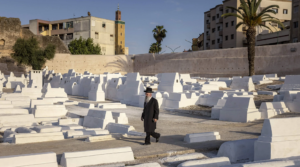In recent months, the never-ending heated debate on the Israel-Palestinian conflict has sometimes boiled over to a new debate: Are Jews indigenous to the land of Israel?
Thousands of years of archaeological and historical evidence shows that Judaism and the beginnings of Jewish people, began in Judea—known today as the state of Israel. Through conquests and imperialism, ethnic Jews have been exiled from their ancestral homeland and subsequently settled in every corner of the world, from Eastern Europe to the Peruvian Amazon. The people who came from that place, what is today called Israel, are referred to, even by people who think we do not belong there, as Jews. Even adversaries like Hamas and Hezbollah do not dispute our right to call ourselves Jews—or, in Arabic, “Yahud” (“Yehuda” meaning Judea).
But as the indigenous rights movement grows, the meaning of indigeneity has become more nuanced. Even some who aren’t trying to deny the geographical history of Jews might be hesitant to call us an indigenous group.
It seemed to me that the best way to tackle this matter would be to let another indigenous party without a dog in the fight, so to speak, weigh in on the matter. So I sat down with Mahrinah von Schlegel, an indigenous advocate belonging to the Tewa people of the Northern Rio Grande Pueblos. Well—her “dog” is partially in the “fight” because she also happens to be a Sephardic Jew. Currently, von Schlegel is a development consultant with Zia Impact and a United Nations NGO representative who also serves on the Ethnic Coordinating Council of the Democratic Party.
“Judaism is a land-based agricultural religion,” von Schlegel told me. “We have had a spiritual and stewardship relationship with the land of Israel since the beginning of our collective memory. Land relationships and stewardship is a critical foundation for any tribe’s indigeneity.”
Von Schlegel draws her definition of indigenous peoples from the United Nations, which defines the term as inheritors of unique cultures who have retained social, cultural, economic and political characteristics distinct from those of the dominant societies in which they live. She noted how indigenous peoples have sought recognition of their identities, lifestyles and their right to ancestral lands throughout history, but their rights have continuously been violated by empires, nation-states and external colonial powers.
This is something to which any Jew over the past thousand years who has chanted “Next Year in Jerusalem!” at a Passover Seder can relate. “I will add that indigenous peoples must practice a land-based tribal religion,” said von Schlegel. “Whether Jews want to acknowledge it or not, our religious practice is both land-based and agrarian, additionally sharing our tribal history across a cyclical lunar calendar.”
As a member of both communities, von Schlegel has experienced firsthand how Pueblo People and Jews share ritual practices of giving thanks for the food, land, knowledge and other gifts from our Creator. In particular, she believes what Jews do every Friday, as we ritually welcome in the “Angels of Peace” to mark the beginning of Shabbat, resembles customary native rituals of welcoming spirits or ancestors.
“It is a completely similar practice, as Jews are also indigenous people,” she explained, noting that her Jewish faith aligns with Native beliefs, with separate expressions due to geography, tribal preference and the way those relationships have evolved. “It is not interfaith; it is intertribal,” she points out.
Von Schlegel believes that all Jewish holidays, and Sukkot in particular, have customs that resemble those of other indigenous cultures. All Native American groups orient themselves among their sacred directions and ritually utilize species (medicines). “We, as indigenous people, pray in the ways and languages of our ancestors as much as we are able. Jews do, too.”
When it comes to the question of Israel, the answer is clear to von Schlegel: “We are indigenous to Israel because it is our ancestral homeland, home to the history and accomplishments of our people, the bodies and blood of our ancestors.” However, some anti-Zionist Jewish activists, such as CODEPINK National Co-Director Ariel Gold, have recently claimed that not all Jews are indigenous to Israel. She has personally disowned her indigenous ties to Israel, claiming that because her family lived in Spain in the 1400s, Spain is her indigenous homeland instead.
Von Schlegel believes that one can lose indigenous identity, but not by living in the Diaspora. “If they became a different identity and are no longer Jews, then they’re no longer indigenous. They’re whatever they became,” she said. “If they don’t pray for Israel, feel themselves a part of our people (in the greater sense—past, present and future generations) or have relationships with our ancestors there, if they don’t identify with our tribe…then they’re not.”
As an indigenous advocate, von Schlegel takes issue with how anti-Zionists have tried to compare Palestinians to Native Americans. According to her, pro-Palestinian activists have visited numerous tribes in America to argue that their narratives are the same. “They are not,” she says, emphatically explaining that pro-Palestinian activists are co-opting the indigenous experience for their own political gain. She believes American Jews should be owning their identity as indigenous peoples, and building relationships with analogous communities.
“Jews are not only indigenous to Israel—we are indigenous peoples. We must remember that,” she noted. “Look into Native communities around your area, learn about them and their needs—connect with them. Understand how similar we are as indigenous peoples, and how we must work together.”
Von Schlegel says she speaks particularly to Jews who live in the Americas. “Native American battles for sovereignty, language reclamation, traditional food production, water protection, ecological preservation, religious expression and defining our modern realities through our own cultural lens not only reflect the same struggles and accomplishments of the Jewish people, but also positively benefit Jewish lives in the United States.”
As indigenous people who reclaimed our ancestral homeland, we must be sensitive to others undergoing that same process.
Hen Mazzig is an Israeli writer and a senior fellow at The Tel Aviv Institute. He descended from Babylonian Jews and Jews of the Amazigh tribe of North Africa. Follow him: @henmazzig.




